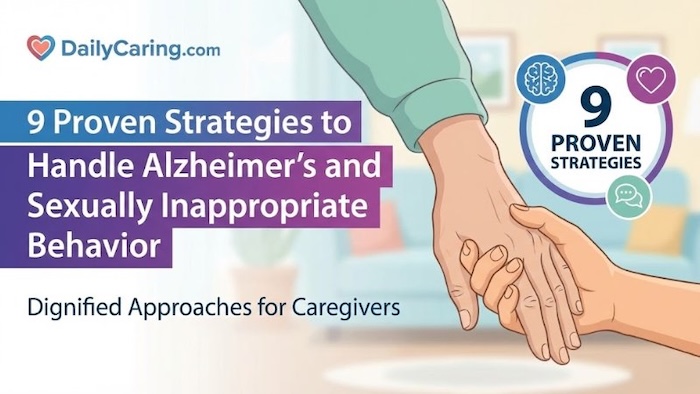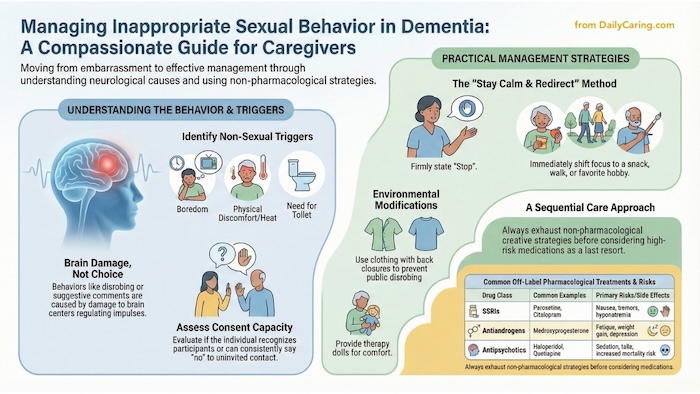Sexually inappropriate behavior in Alzheimer's patients (such as inappropriate comments, disrobing, or unwanted advances) can be one of the most distressing and misunderstood symptoms for caregivers to manage.
While these actions are typically caused by neurological changes rather than intentional misconduct, they create valid discomfort and ethical dilemmas for families and care staff.

This article shares nine compassionate, expert-approved strategies for redirecting these behaviors while preserving your loved one's dignity.
From identifying triggers to creating safe boundaries, you'll learn practical ways to respond without shame or frustration – because even in dementia's most challenging moments, kindness remains the compass.
Inappropriate Sexual Behavior in Dementia is Challenging
Inappropriate sexual behavior is a disturbing thing that can happen when someone has Alzheimer’s or dementia. It can be one of the most challenging behaviors because it often makes caregivers feel uncomfortable, embarrassed, or frightened.
We explain what causes this behavior, share nine ways to help you cope, and give plenty of ideas and examples.
VIDEO: Navigating Inappropriate Sexual Behaviors and Dementia
What Causes Sexually Inappropriate Behavior in Dementia?
It might seem strange that someone you once knew as proper or respectful might suddenly be showing sexually inappropriate behavior.
The most important thing to understand is that this behavior is caused by damage to their brain; it’s not something they’re doing on purpose. Dementia affects parts of the brain that regulate a person’s responses. That’s why learning how to distract and redirect them to more appropriate activities is essential.
A person with dementia could act in sexually inappropriate ways toward their spouse, their children, professional caregivers, or strangers. They are likely to be confused about who a person is or might have forgotten that they already have a spouse. They may become angry or upset if they feel rejected.
Inappropriate sexual behavior could be caused by a need to feel intimacy again, needing comfort, or being bored. Sometimes, people with dementia may even take off their clothes or masturbate in public. This could be caused by disorientation, not knowing they’re not in a private place. Or, it could be because they’re uncomfortable or need to use the toilet.

9 Ways to Cope with Alzheimer’s and Sexually Inappropriate Behavior
Each person will respond differently to these responses and interventions. We’ve included many suggestions and tips – experiment to see which ones work for your older adult.
1. Manage inappropriate behavior when it happens
- Stay calm and be patient.
- Gently but firmly tell the person that the behavior is inappropriate.
- Match your body language to your words – frown and shake your head. People with dementia are better at reading nonverbal cues.
- Maintain consistent, firm boundaries. Don’t accidentally encourage inappropriate behavior by sending mixed signals, like briefly allowing it once and then reacting negatively the next time. Be consistently firm every time, saying “No, stop. I don’t like that,” or “Stop, that’s not right.”
- Distract them and redirect to a positive activity. To distract, ask a question, turn on the TV, or offer a snack. To redirect, turn on some music they like, go for a walk, or bring out their favorite hobby.
- Move your loved one to another location. This takes them away from what’s triggering their behavior. Guide them to a quiet area in a public place or to their bedroom at home.
- If nothing else works, shock them a bit by raising your voice and saying “No!” firmly. Grab their hands and put them back in their lap. Look them in the eye, frown, and shake your head to let them know this behavior will not be tolerated.
2. Explain sexual behavior to other people
- Let family, friends, and visitors know ahead of time that inappropriate behavior or sexual remarks might happen and that it’s caused by the damage to their brain from Alzheimer’s or dementia.
- Calmly ask other adults to excuse their behavior or advise them to step back a bit.
- Keep a little space between your older adult and other people. When you walk them into a room, leave enough space so they can’t easily touch someone, especially if they tend to grab.
3. Identify triggers and try to prevent the inappropriate behavior from starting
- Keep their hands occupied with a fidget activity or sensory activity.
- Provide alternatives to cuddling: a soft blanket, a stuffed animal, or a doll can satisfy the need for touch.
- Boredom can also cause sexual behavior. Keep your older adult happily occupied with different types of engaging activities.
- Keep a caregiving journal of the inappropriate behaviors to identify the triggers. For example, you might notice that Mom lifts her skirt or Dad touches himself when they need to use the bathroom.
4. Make it difficult for them to remove clothing
To prevent spontaneous undressing, get specially designed clothing that closes in the back, making it difficult for them to remove their clothes.
5. Talk with a doctor, nurse, or healthcare professional
Talk with their doctor, a nurse, or another healthcare professional. They may be able to figure out what’s causing the behavior and how to treat it.
6. Lean on trusted family or friends
Consider talking with a trusted family member or friend. This will give you an ally in your circle who will be aware of what’s happening and can offer emotional support.
7. Join a caregiver support group
You’re not alone in dealing with sensitive issues like this. Caregiver support groups are an excellent resource. If you’re shy about speaking about sex in person, you might be more comfortable in an online support group.
There are many great free and private online groups. Here are 11 that we recommend. One of these, Memory People, has a women-only subgroup, where some members feel more comfortable discussing issues related to sex.
8. Spouses can adapt relationships and find other ways to fulfill the need to be close
Sex between you and your spouse with dementia is a complex topic. It’s essential to recognize that sexual desires and drives might change for both of you.
In the early stages, encourage them to discuss their feelings and emphasize the value of your relationship with or without sex. A therapist could also help with these discussions.
Additional tips for spouses:
- Give extra reassurance and physical attention through activities like snuggling while watching TV, giving hugs or a massage, or dancing together.
- Showing affection through touch or kissing can also provide the comfort and security that come from being with the person they trust.
- If it feels right for you, consider separate sleeping arrangements.
9. Prepare for sexual behavior in assisted living or memory care
Ask the assisted living community about their policy on sexual relationships and behaviors. It’s essential to discuss policies related to sexual abuse and a resident’s ability to give meaningful consent.
Final Thoughts on Sexually Inappropriate Behavior and Alzheimer's Disease
Caring for your loved ones with dementia is one of the toughest, loneliest jobs on the planet. It's easy to feel like you're drowning in the moment, reacting to the outbursts and the confusion. But what if there's a different way to see it? What if the chaos isn't the whole story? You can indeed find moments of quiet, pockets of calm, and even the occasional flash of a familiar smile.
The strategies in this piece, whether it's redirecting, using humor, or protecting their dignity, aren't just about managing behavior. They're about protecting the person you love, the one who's still in there.
They're about protecting your own heart, too. This work can chip away at your soul if you let it, or it can teach you a kind of patience you never knew you had. Don't lose sight of the human being behind the disease.
Your love is the anchor in this storm. Keep reaching out, keep finding your people, and remember: this isn't a fight to be won, but a path to be walked with as much grace as you can muster, one step at a time.
Recommended for you:
- 6 Ways to Help Seniors with Alzheimer’s Keep Hands Busy
- 12 Engaging Activities for Seniors with Dementia: Reduce Agitation and Boost Mood
- The Positive Effect of Therapy Dolls for Dementia
About the Author

Connie is the founder of DailyCaring.com and was a hands-on caregiver for her grandmother for 20 years. (Grandma made it to 101 years old!) She knows how challenging, overwhelming, and all-consuming caring for an older adult can be. She also understands the importance of support, especially in the form of practical solutions, valuable resources, and self-care tips.














This article is so helpful and super informative and has enhanced my understanding of inappropriate behavior with Dementia patients. How to give care and prevent them from causing harm to themselves and others and how to prevent myself from being harmed by them
My father has dementia, and goes to varies illegal places to get sexually satisfied. He goes twice a day every day and when confronted He has forgotten he has been there.
We are trying to redirect but he lives alone .
Are there any other suggestions you may have for us. I just want him safe.
It sounds like your father is not using good judgement and engaging in unsafe behavior. If his cognitive impairment has progressed to a point where he can no longer care for himself, it may be time to hire in-home caregivers or to have him move to a memory care community.
More info here:
– 7 Steps for Hiring a Caregiver for In-Home Help https://dailycaring.com/7-steps-for-hiring-a-caregiver-for-in-home-help/
– Memory Care: Assisted Living for Alzheimer’s and Dementia https://dailycaring.com/alzheimers-dementia-memory-care-basics/
I am a healthcare worker and I have been advised to join this site by a friend who has a parent with Dementia. This article has helped me understand inappropriate behaviour of clients at my work place.
So glad this article is helpful and that you’ve found us!